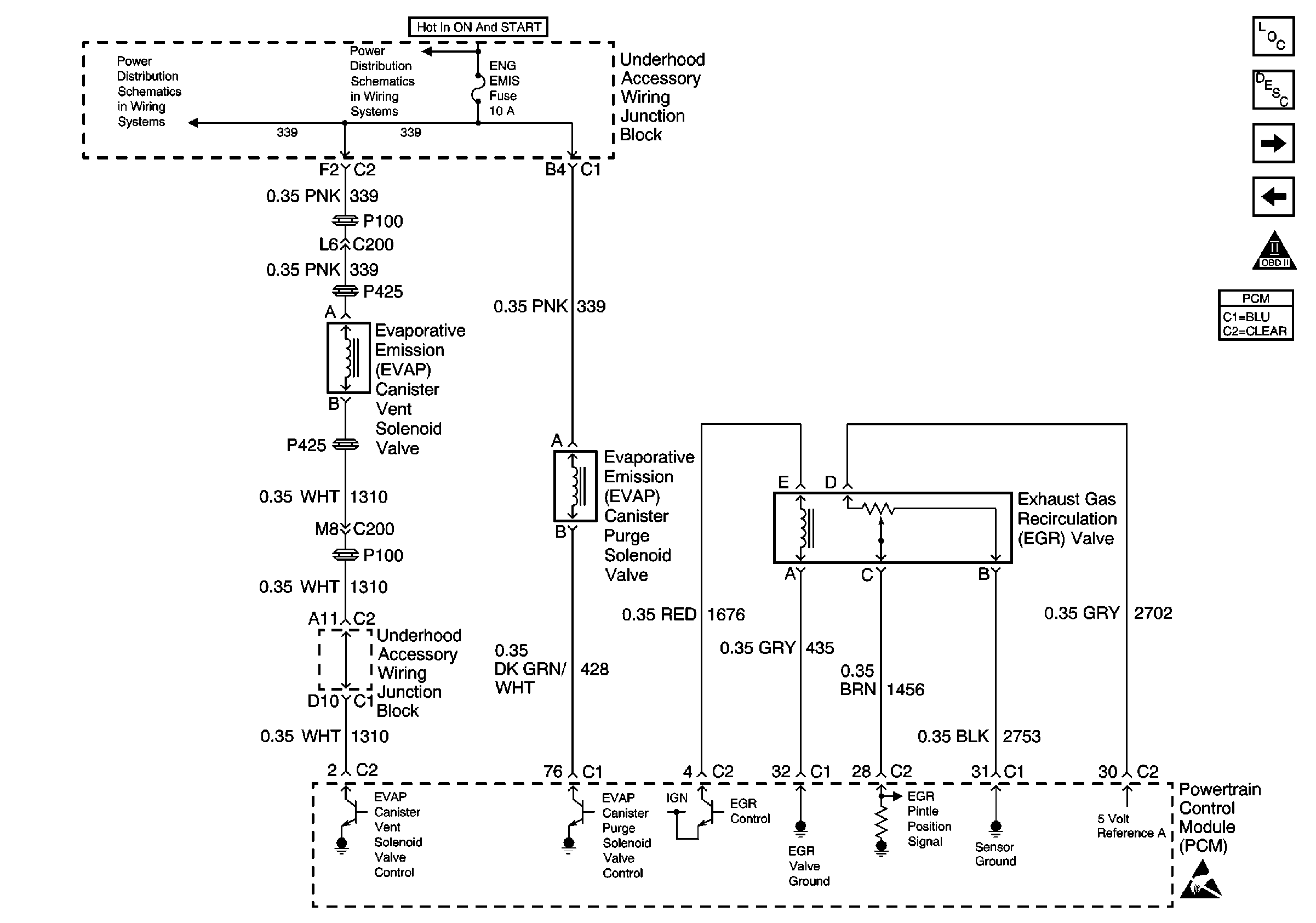Refer to Engine Controls Schematics
PCM Emission Inputs

.
Circuit Description
The powertrain control module (PCM) monitors the exhaust gas recirculation (EGR) valve pintle position input to ensure that the valve responds properly to commands from the PCM. The linear EGR valve is controlled by using an ignition positive driver and ground circuit within the PCM. The driver has the ability to detect an electrical malfunction in the ignition positive or ground circuit. If an electrical malfunction occurs, the driver signals the PCM to set DTC P0403.
Conditions for Running the DTC
| • | The ignition voltage is between 9-18 volts. |
| • | The engine speed is more than 80 RPM. |
| • | The PCM driver transitions from ON to OFF or from OFF to ON. |
Conditions for Setting the DTC
| • | A short to ground, an open circuit, or a short to battery voltage is detected on the control circuit. |
| • | The condition is present for at least 30 seconds. |
Action Taken When the DTC Sets
| • | The PCM illuminates the malfunction indicator lamp (MIL) on the second consecutive ignition cycle that the diagnostic runs and fails. |
| • | The PCM records the operating conditions at the time the diagnostic fails. The first time the diagnostic fails, the PCM stores this information in the Failure Records. If the diagnostic reports a failure on the second consecutive ignition cycle, the PCM records the operating conditions at the time of the failure. The PCM writes the conditions to the Freeze Frame and updates the Failure Records. |
The PCM will disable EGR for the ignition cycle.
Conditions for Clearing the MIL/DTC
| • | The PCM turns the MIL OFF after 3 consecutive drive trips during which the diagnostic runs and passes. |
| • | A last test failed, or the current DTC, clears when the diagnostic runs and passes. |
| • | A History DTC clears after 40 consecutive warm-up cycles, if no other emission related diagnostic failures are reported. |
| • | Use a scan tool in order to clear the MIL diagnostic trouble code. |
| • | Interrupting the PCM battery voltage may or may not clear DTCs. This practice is not recommended. Refer to Powertrain Control Module Description , Clearing Diagnostic Trouble Codes. |
Diagnostic Aids
Notice: Use the connector test adapter kit J 35616-A for any test that
requires probing the following items:
• The PCM harness connectors • The electrical center fuse/relay cavities • The component terminals • The component harness connector
If the problem is intermittent, refer to Intermittent Conditions .
Test Description
The numbers below refer to the step numbers on the diagnostic table.
-
This step verifies that the malfunction is present.
-
If DTC P0403 will only set under certain conditions, the malfunction may be intermittent. Refer to Diagnostic Aids.
-
This vehicle is equipped with a PCM which utilizes an electrically erasable programmable read only memory (EEPROM). When the PCM is being replaced, the new PCM must be programmed.
Step | Action | Value(s) | Yes | No | ||||
|---|---|---|---|---|---|---|---|---|
1 | Did you perform the Powertrain On-Board Diagnostic (OBD) System Check? | -- | ||||||
With the engine idling, observe Actual EGR Position on the scan tool. Is Actual EGR Position at the specified value? | 0% | |||||||
Does Desired EGR Position remain close to Actual EGR Position at all commanded positions? | -- | |||||||
Does the scan tool indicate DTC P0403 failed this ignition? | -- | Go to Diagnostic Aids | ||||||
5 |
Is the test lamp ON with the commanded EGR valve position at 100 percent? | -- | ||||||
6 | Probe the EGR valve ground circuit at the EGR valve harness connector with a test lamp to B+. Is the test lamp ON? | -- | ||||||
7 | Probe the EGR valve control circuit at the EGR valve harness connector with a test lamp to B+. Is the test lamp ON? | -- | ||||||
8 |
Was a problem found and corrected? | -- | ||||||
9 |
Is the test lamp ON? | -- | ||||||
10 |
Was a problem found and corrected? | -- | ||||||
11 | Replace the EGR valve. Refer to Exhaust Gas Recirculation Valve Replacement . Is the action complete? | -- | -- | |||||
12 | Locate and repair the short to voltage in the EGR valve control circuit. Refer to Wiring Repairs in Wiring Systems. Is the action complete? | -- | -- | |||||
13 |
Is the test lamp ON? | -- | ||||||
14 |
Is the test lamp ON? | -- | ||||||
15 |
Was a problem found and corrected? | -- | ||||||
16 | Locate and repair the short to voltage in the EGR valve ground circuit. Refer to Wiring Repairs in Wiring Systems. Is the action complete? | -- | -- | |||||
17 |
Was a problem found and corrected? | -- | ||||||
18 | Locate and repair the short to ground in the EGR valve control circuit. Refer to Wiring Repairs in Wiring Systems. Is the action complete? | -- | -- | |||||
19 |
Was a problem found and corrected? | -- | ||||||
|
Important: The replacement PCM must be programmed. Replace the PCM. Refer to Powertrain Control Module Replacement/Programming . Is the action complete? | -- | -- | ||||||
21 |
Does the scan tool indicate that this test ran and passed? | -- | ||||||
22 | Review Captured Info using the scan tool. Are there any DTCs that have not been diagnosed? | -- | Go to the applicable DTC table
| System OK |
